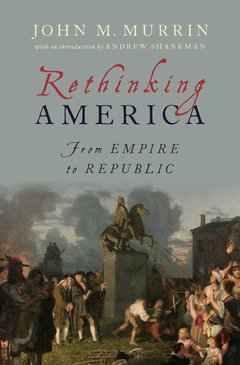Description
Rethinking America
From Empire to Republic
Author: Murrin John M.
Language: English
Subjects for Rethinking America:
Publication date: 05-2018
424 p. · 16.3x24.1 cm · Hardback
424 p. · 16.3x24.1 cm · Hardback
Description
/li>Biography
/li>
For five decades John M. Murrin has been the consummate historian's historian. This volume brings together his seminal essays on the American Revolution, the United States Constitution, and the early American Republic. Collectively, these essays rethink fundamental questions regarding American identity, the reasons why colonists felt compelled to declare their independence, and the myriad ways that the American Revolution produced a profoundly transformative change in those who lived through it. They reconsider questions that have shaped the field for several generations and connect those questions to issues of central interest to historians working today. Collectively, the essays gathered here argue that the great historiographical schools that have long competed to explain the American Revolution must move towards a synthesis that allows the whole to be greater than the parts. The essays show how high politics and the study of constitutional and ideological questions--broadly the history of elites--must be considered in close conjunction with issues of economic inequality, class conflict, and racial division. By bringing together different historiographical schools and a variety of perspectives in both Britain and the North American colonies, Rethinking America explains why what began as constitutional argument that virtually all expected would remain contained within the British Empire exploded into a truly subversive, destructive, and radical revolution that destroyed monarchy and aristocracy and replaced it with a rapidly transforming and wildly pulsing republic. The essays examining the period of the early American Republic discuss why the Founders' assumptions about what their Revolution would produce were profoundly different than the society that emerged from the American Revolution. In many ways, the outcome of the American Revolution put the new United States on a path to a violent and bloody civil war, as is shown by an essay directly comparing the American colonists of 1776 to the Confederate States of America in 1861. A much anticipated work, this volume offers both groundbreaking and timeless analysis of the nation's critical first decades as it moved from empire to republic.
John Murrin is one of the foremost scholars of early America and is the author of over 50 essays and the textbook Liberty, Equality, Power. He is a former President of the Society for Historians of the Early American Republic and was for over 30 years a professor of history at Princeton University. Andrew Shankman, Associate Professor at Rutgers University-Camden, is the author of Original Intents: Hamilton, Jefferson, Madison, and the American Founding and Crucible of American Democracy: The Struggle to Fuse Egalitarianism in Jeffersonian Pennsylvania, and the editor of The World of the Revolutionary American Republic: Land, Labor, and the Conflict for a Continent and Anglicizing America: Empire, Revolution, Republic.
© 2024 LAVOISIER S.A.S.




